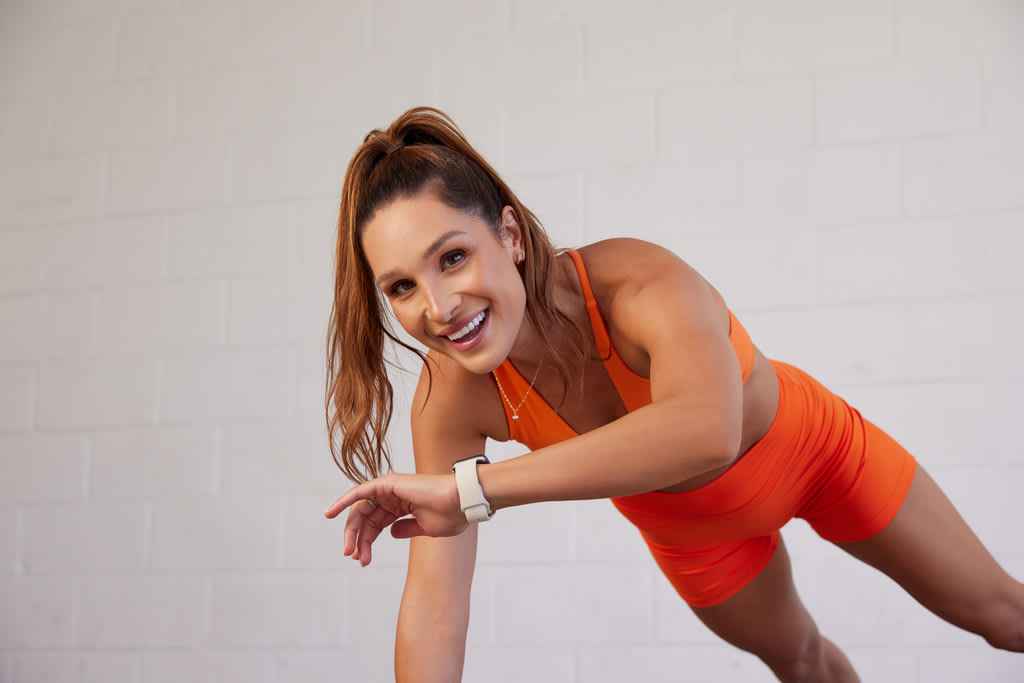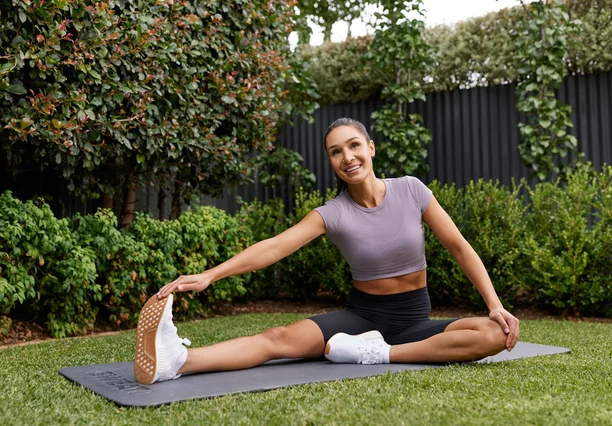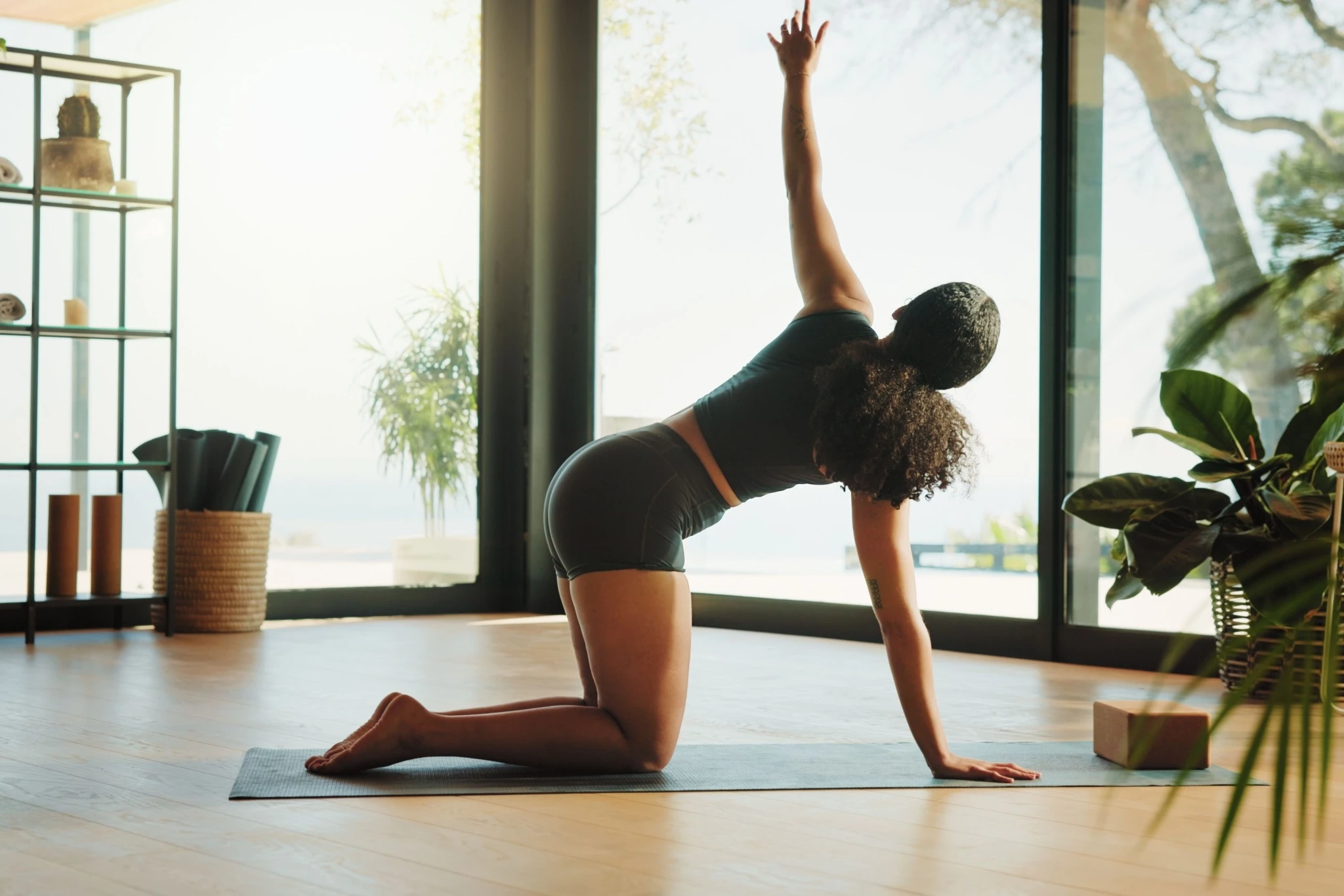Here's The Best Time To Work Out For YOU
Better to train in the morning, at noon or at night? Here are the pros and cons of each of them.

March 26, 2021 - Updated January 12, 2026

For some of us, smashing out a Sweat session before the sun comes up doesn't take a second thought, meanwhile other people are squeezing in lunchtime workouts or heading to the gym after work. Is there an ideal time to maximise results and feel your best?
Ultimately, the best time to work out is whenever it works best for you. Life is hectic, and sometimes, the best free time slot is also the only free slot you have. The best exercise routine and the one you’ll reap the most fitness benefits from is the one you can stick to long-term, and finding something sustainable is far more important than what the clock says.
However, there are definitely some pros and cons to working out at different times of day. Read on to discover the benefits of exercising in the morning, noon and night if you're trying to decide when to train.
Firstly, listen to what your body is telling you
Before we even look at the research, it's important to remember that everybody is different, and a huge part of the answer can be found in simply paying attention to your own body.
What time of day do you have the most energy? First thing in the morning or later in the day when you've had some food?
What time of your day are you least likely to skip?
What time will best support your sleep, energy and stress? For some people, an evening workout creates the perfect conditions for a good sleep, while for others it leaves them wired.
Do you enjoy exercise more at a particular time of day?
Think about your body’s natural energy and sleep patterns, your daily schedule and responsibilities, how long your workouts are and when you feel the most motivated. These factors will help you pinpoint your best time of day to work out. The most important thing is finding a time that works for you and creating healthy habits that make your body feel good, but different times of day do come with different benefits, so let’s dive in!

The benefits of morning exercise
It's out of the way: When life is busy, exercising in the morning can be the best thing to tick it off and make sure nothing else gets in the way of it.
Energy, mood and brain boost: A boost of endorphins is a great way to start the day. Research published in the British Journal of Sports Medicine also concluded that moderate-intensity exercise in the morning improves working memory or cognitive function!
Weight loss: If weight loss is a goal of yours, there is a range of research from 2019, 2020 and 2022 indicating that morning workouts could be a better option. Ultimately however, the trick to any weight loss goal is creating sustainable habits, so if afternoon or evening workouts make more sense with your lifestyle, do that!
Circadian rhythm: A 2019 study published in the Journal of Physiology found morning exercise may help shift your circadian rhythm so your body feels more alert in the morning and more sleepy when you’re ready to go to bed.
Sleep quality: While everyone is different and there are always other lifestyle factors at play, a 2014 study found people who performed aerobic exercise at 7 am spent more time in the deep sleep cycle – which is the most restorative sleep phase – than those who did cardio at 1 or 7 pm.
Morning exercise: Things to be mindful of
Getting up early can mean losing sleep and feeling more tired overall. As a result, you may need to adjust your nighttime routine and go to bed earlier. We don't recommend consistently sacrificing sleep for exercise.
If you exercise first thing before eating, you might feel weak or low in energy. If you find it hard to work out on an empty stomach, a piece of toast or fruit is a great, light option.
If you’re tired or groggy during a morning workout, your performance, focus and coordination may be impaired. Your ideal workout time is when you're energised and alert.
If it’s cold in the morning or you wake up feeling stiff, you might need a longer warm-up before you start your workout.
If you simply find it hard to get yourself out of bed in the morning, you might need to make some broader lifestyle changes. Here's our advice on becoming a morning person.

The benefits of afternoon and evening workouts
Better athletic performance: Exercising later in the day means your body is warmer, you're more awake, and you've got more fuel in the tank. According to a 2012 review, the effect of time of day on aerobic performance has been well established, with peak performance being in the late afternoon. Other 2020 research also supported this, saying that peak performance is often better between 4 pm and 8 pm for short-duration max-effort exercise such as jumps, sprinting and muscle contractions - perfect for all the HIIT and lifting programs in the Sweat app.
Better alertness: We don't want you working out half-asleep, and recommend afternoon or evening exercise if that's when you feel more mentally ready to move. The enjoyment, effectiveness and results of your workout are all likely to be better when you feel most alert.
Stress relief: Many people choose to work out later in the day to let off steam, disconnect from work and prepare for a good night's sleep.
Afternoon and evening workouts: Things to be mindful of
Exercising later in the day can have positive or negative effects on your sleep. One 2018 review found that evening exercise helped improve sleep measures, as long as the exercise was completed over an hour before bed. Experiment with your workout timing and see how it affects your sleep.
If you’ve had a stressful day or are exhausted, an intense evening workout may add more stress to your system. On those days, it might be best to choose lower-intensity movement or take a rest day.
It’s important to nourish your body with a good meal after a workout, but not everyone feels hungry straight after exercise. If your appetite takes a while to return, it’s best to avoid exercising too late in the evening so you don't go to bed with a full stomach.
Find your own rhythm
Whether you exercise morning, noon or night, the benefits are indisputable: from increased stamina and strength to improved blood pressure, stronger bones and muscles and better sleep.
And don't forget, the best time to get your body moving is whatever time works for YOU. This could mean sticking to a regular time each day or a mix of morning, noon and night workouts depending on your schedule, health and mood.

A more empowered you starts with Sweat, and our editorial team is here to bring you the latest fitness tips, trainer recommendations, wellbeing news, nutritional advice, nourishing recipes and free workouts.
* Disclaimer: This blog post is not intended to replace the advice of a medical professional. The above information should not be used to diagnose, treat, or prevent any disease or medical condition. Please consult your doctor before making any changes to your diet, sleep methods, daily activity, or fitness routine. Sweat assumes no responsibility for any personal injury or damage sustained by any recommendations, opinions, or advice given in this article.
Fitness